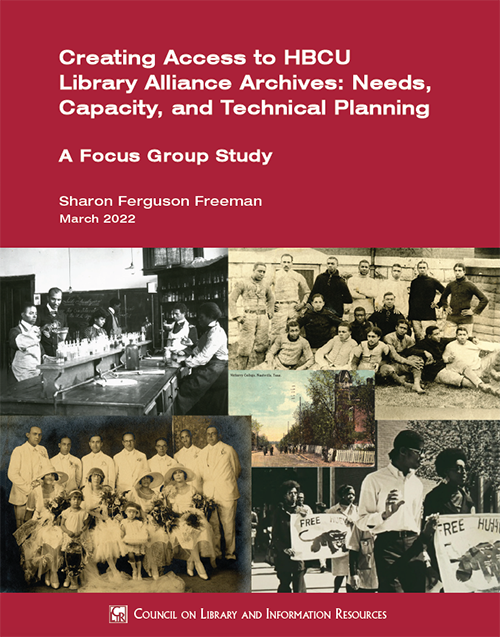
Creating Access to HBCU Library Alliance Archives: Needs, Capacity, and Technical Planning
Freeman, Sharon Ferguson (Mar 2022, 72 pp.)
This study explores the common barriers and shared visions for creating access to archival collections held by libraries at Historically Black Colleges and Universities (HBCUs). One of few reports that document the needs of HBCU libraries as they relate to archives and special collections, it is based on a series of online focus groups that author Sharon Ferguson Freeman facilitated with HBCU library directors and deans in 2021. The study provides insight into the significance of special and archival collections for HBCU libraries and their communities; the management and capacity of archives and special collections; and these libraries' values, priorities, needs, and aspirations. The findings also reveal information related to the impact of the COVID-19 pandemic on HBCUs and broader topics of significance that were not anticipated when the project began.
In parallel with Freeman's research, Portia D. Hopkins and Synatra A. Smith conducted a series of interviews with staff working at five HBCUs, investigating their libraries' unique priorities, resources, and work processes. Smith and Hopkins prepared an internal report with a detailed set of strategic and technical recommendations for the HBCU Library Alliance. An executive summary of their findings is appended to the report and available separately as a separate download.
This two-part study grew out of a partnership formalized in 2019 between the HBCU Library Alliance and CLIR, and a 2020 Mellon Foundation grant for a study to inform a sustainable shared infrastructure for creating access to HBCU Library Alliance members' archival collections.
Related Resources
The discussion guide used for this study is available under a CC BY-NC-SA 4.0 license.
A series of in-depth virtual interviews about special collections and archival holdings, technical capacity, and researcher needs was conducted with a select group of library staff and faculty based at HBCUs, in coordination with the above study. While results of the interviews will only be shared with relevant stakeholders from the HBCU Library Alliance, the accompanying interview questions are freely available.